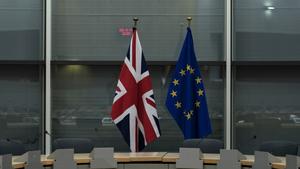 The flag of the United Kingdom and the flag of European Union are displayed prior to the meeting between then UK Brexit Minister Stephen Barclay and then EU chief Brexit negotiator Michel Barnier on Sept 20, 2019, in Brussels. (KENZO TRIBOUILLARD / POOL / AFP)
The flag of the United Kingdom and the flag of European Union are displayed prior to the meeting between then UK Brexit Minister Stephen Barclay and then EU chief Brexit negotiator Michel Barnier on Sept 20, 2019, in Brussels. (KENZO TRIBOUILLARD / POOL / AFP)
BERLIN - The German government is urging other EU states to prepare for a no-deal Brexit, according an internal document that casts doubt on Britain’s optimism over chances of an early agreement on its future ties with the bloc.
The German government document, dated June 15 and seen by Reuters, shows Berlin expects the negotiations to take longer
Britain left the European Union on Jan 31 and their relationship is governed by a transition arrangement that keeps previous rules in place while new terms are negotiated.Prime Minister Boris Johnson, who confirmed last week that Britain has no intention of extending that transition beyond 2020, wants to strike a free trade deal quickly.
ALSO READ: UK retreats on plan for strict customs checks after Brexit
On Monday, he suggested an agreement could be reached in July with “a bit of oomph”. But the German government document, dated June 15 and seen by Reuters, shows Berlin expects the negotiations to take longer.
“From September, the negotiations enter a hot phase,” it read. “Britain is already escalating threats in Brussels, wants to settle as much as possible in the shortest possible time and hopes to achieve last-minute success in the negotiations.”
The German Foreign Office was convinced the transition deal would not be extended beyond the end of this year, the government document showed.
“It is therefore important to preserve the unity of the 27, to continue to insist on parallel progress in all areas (overall package) and to make it clear that there will be no agreement at any price,” the document read.
ALSO READ: EU states stress need to avert hard Brexit on costs
“Therefore, both national and European contingency planning would now have to start in order to be prepared for a no deal 2.0.”
The withdrawal agreement on Britain’s departure was only struck after bitter negotiations that threatened to end in a no deal Brexit, but Berlin did not believe the situation was as critical this time around.
“The situation is less serious than in 2019, as important regulations, for example for citizens, were sorted out in the withdrawal agreement,” the document read.
With the two sides so far apart and little time left to negotiate, there are concerns that London’s decision not to extend the transition might lead to a cliff edge that could compound the economic damage caused by the coronavirus crisis.
READ MORE: UK plans soft border checks with EU, deal or no-deal
Meanwhile, the European Union’s chief executive, Ursula von der Leyen, said on Wednesday that the bloc will do its best to seal an agreement on new ties with Britain by the end of the year but will not compromise its core values, notably on fair competition.
“The negotiations with the UK always promised to be difficult and they have not disappointed,” von der Leyen, the head of the European Commission, told the European Parliament.
“We are now halfway through these negotiations with five months left to go. But we’re definitely not halfway through the work to reach an agreement ... We will do all in our power to reach an agreement.”
She said British Prime Minister Boris Johnson had confirmed to her this week that London would not seek to prolong negotiations on a new EU-UK trade deal beyond December.
READ MORE: UK says on Brexit: Progress is limited & talks need to speed up
The EU says Britain cannot retain all the economic and trading benefits it had as an EU member, while London says Brussels is not showing enough flexibility.
“We’re ready to be creative to find common ground,” von der Leyen said.
But she went on to say said there could be no deal without “level playing field” guarantees of fair competition, and agreements on fisheries and on dispute-settling mechanisms.


